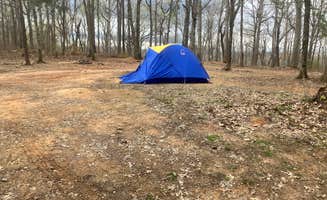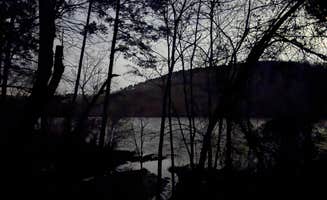Dispersed camping options around Concord, North Carolina extend beyond the Uwharrie National Forest. The region contains multiple free primitive campsites at elevations ranging from 500-950 feet with moderate terrain. Local weather patterns typically allow for year-round camping, though winter nights can drop below freezing with daytime temperatures reaching 60°F during winter months.
What to do
Off-road adventures: Uwharrie National Forest provides extensive OHV trails for Jeeps and other off-road vehicles. According to one camper, "We took our Jeep on the OHV trails and had a blast. There are several places you can take a canoe or kayak on and the scenery on the lake was beautiful as well." The forest road system accommodates different vehicle capabilities throughout the 50,000-acre forest.
Water activities: Uwharrie National Forest offers multiple paddling opportunities along Little River. One visitor notes, "Me and my friends would always float our kayaks down the river to a place we called 'Bird Dog' and camp for the night." The Little River boat ramp at Pekin Road provides water access for canoes and kayaks.
Multi-use trails: The forest contains numerous hiking paths beyond the main Uwharrie Trail. Trails accommodate mountain biking, horse riding, and hiking with varying difficulty levels. As one reviewer mentions, "There are hiking, horse, OHV, dirt bike, ATV, and mountain bike trails" throughout the forest system.
What campers like
Seclusion options: Birkhead Mountain Wilderness Area Dispersed provides hike-in only camping away from vehicle noise. A camper reports, "Very nice trails. Well maintained. Not marked the best... signs at intersections. Plenty of creeks. Hike in for dispersed camping." This area remains less developed than other sections of the forest.
Water sources: The numerous creeks throughout the forest provide reliable filtration sources for extended stays. One backpacker notes, "The streams, provided one has filtration or iodine tablets, provide ample sources of drinking water." Most established campsites are positioned near water access points.
Wildlife viewing: The forest supports significant deer populations and other wildlife. A hunter-camper explains, "This area was a place that I went often to deer hunt in the fall. I have never came across another camper/hunter at this location. It is a good location if you are looking for an area that is away from camp grounds and heavy traffic."
What you should know
Seasonal safety: Hunter presence increases significantly during fall. One camper warns, "Make sure to wear bright colors during hunting season because there are a ton of people out deer hunting in this area." Orange safety vests or bright clothing items become essential during these periods.
Site maintenance: Dispersed Camping off Falls Dam Trail and other free camping areas near Concord require visitor stewardship. A reviewer suggests, "Some of the sites may have a little trash left from the last user, so please try to leave it cleaner than you came to." Pack-out practices remain essential as most sites lack trash service.
Access requirements: Most free camping sites require appropriate vehicles. "This is a great area for dispersed campers with 4WD or AWD. It's pretty popular so head out early to secure your spot," advises one regular visitor. Road conditions worsen significantly after rainfall, particularly on forest service roads.
Tips for camping with families
Site selection: Choose camping areas farther from Highway 24 to minimize road noise. A reviewer recommends, "If you want to get away from traffic noise completely, hike farther in." The trade-off between accessibility and quiet often determines family camping satisfaction in the region.
Space considerations: Robbins Branch Trail offers drive-in sites with adequate room for family setups. At other established sites, one camper notes, "The tent sites nice and clean and level. The host drove through many many times in the 3 days I was there." Regular ranger patrols provide additional security at developed areas.
Water planning: Families should bring sufficient water or proper filtration equipment. "Obviously, there are no facilities, so I had to take my own water and a water filter," explains one camper. Most creeks remain reliable water sources when filtered properly.
Tips from RVers
Generator use: Some dispersed areas permit generators while others prohibit them. One RVer shares, "We used our pop-up with a generator in rustic locations." Check specific area regulations before planning generator-dependent camping.
Size limitations: Forest roads typically accommodate smaller recreational vehicles but restrict large rigs. Most dispersed sites can't accommodate vehicles longer than 25 feet, and turning radius limitations exist throughout the forest road system.



